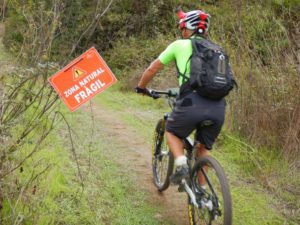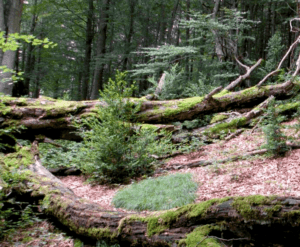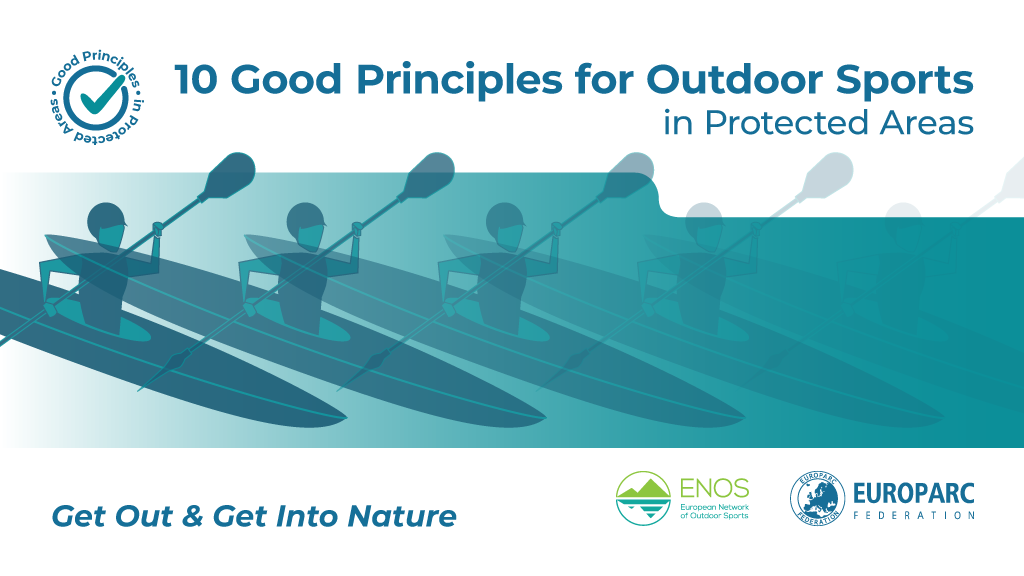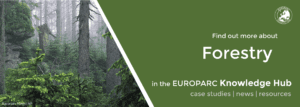EUROPARC joins the new SEE project
EUROPARC joins the new SEE project. Led by Leave No Trace Ireland, ‘SEE’ stands for Sustainability and Environmental Education in Outdoor Sports.
Outdoor sports & Nature
The connection between outdoor sports and nature seems to be an obvious one, and indeed, through the pandemic more than ever people are drawn to the outdoors. However, just because activities are practiced outside, does not mean that they are done in harmony with nature. A thought-provoking article by Alex Roddie for The Great Outdoors Magazine sheds light on this phenomenon. For some outdoor sports practitioners, there is a gap between being out in, and enjoying, nature and looking after our shared natural heritage. The ‘SEE’ projects wants to look at challenges of outdoor sports across Europe and train outdoor sports trainers in good practice, to allow increased participation so that more people can enjoy the recognised benefits of Health Enhancing Physical Activity in the outdoors.
Protected Areas and Outdoor Sports
There is no doubt, that outdoor sports offer many benefits to people of all ages. It allows for positive contact with nature, be with friends and remain mentally and physically healthy. Outdoor sports can often be supporters of Protected Areas and on the whole our Parks and Protected areas welcome such activities, but how can we manage these better to ensure outdoor sports are more sustainable and that the impacts of such activities are minimised and mitigated?
To answer that question, EUROPARC has joined the SEE project: an extensive collaboration with partners from across Europe that together want to explore the topic of sustainability and environmental education. The project began in January of this year and is funded by the European Commission under the Erasmus + Sports programme. It will run for three years.
Practicing outdoor sports in harmony with nature needs well-educated trainers of outdoor sports on the topic of sustainable outdoor activities
This is why EUROPARC is excited to join this project. To practice outdoor sport in Protected Areas in harmony with nature, we need trainers of outdoor sports themselves to have sound environmental and sustainable training, knowledge and skills, in order to build this capacity in the whole sector.
The project

Mountain biker in the Menorca Race
The SEE project takes on a multi-disciplinary approach to the development and application of training needs. The approach ensures that it is both robust yet deliverable in a practical manner for grassroots outdoor sports. In it’s initial stage, the project will examine the challenges facing increased participation of outdoor sport across Europe. With this data a toolkit, which will emphasise educational and environmental good practise, will be developed. This toolkit will undergo rigorous testing and evaluation throughout Europe, and the results will be disseminated across social media platforms, including the creation of a SEE project website.
Ultimately this project is about the citizens of Europe enjoying a better, healthier, and happier lifestyle.
Ensuring that outdoor sports are managed sustainably and responsibly in natural and Protected Areas will enable greater confidence to allow increased participation, so that more people can enjoy the recognised benefits of Health Enhancing Physical Activity in the outdoors.
The collaborative and multi-disciplinary approach is ensured through 10 partners from 9 EU countries:
- Leave No Trace Ireland
- Technical University Munich
- Sport Northern Ireland
- National Resource Centre for Expertise and Sport Performance
- The National Institute for Physical Education in Catalonia
- International Mountain Biking Association Europe
- Mountaineering Association Tara
- Surf Clube de Viana
- Folkungaland
- EUROPARC Federation
EUROPARC’s role
The project is an excellent opportunity for EUROPARC’s network to report on impacts identified by individual and multiple outdoor sports and to provide and exchange on ways to minimise and mitigate them.
To this end, we will launch a survey – in several languages – to all our members in order to identify these challenges and opportunities on all different types of habitats. We look forward to receiving your feedback, so do “watch this space” for all updates. Members will receive the link to the survey via email.
Contact
If you would like to find out more about the SEE Project, you can get in touch with Dr Noel Doyle, who is the project co-ordinator. You can email him at noel@leavenotraceireland.org
The contact person for the EUROPARC Federation is Teresa Pastor: teresa.pastor@europarc.org

We will continue to post updates on the projects through our website and social media. Already interested in proper behavior in outdoor sports? Have a look at EUROPARC’s cooperation with ENOS:
Call for tenders: External Service Contract for project evaluation
Within the LIFE Preparatory Project, ‘LIFE e-Natura2000: supporting e-learning and capacity building for Natura 2000 managers‘, we are looking for an external service to produce a consultancy advice and to secure technical development expertise support and advice that can be delivered to consolidate and link the project’s technical tools
Purpose of the tender
The primary aim of the external services to be provided is to enable the project’s digital platforms and tools to continue to be available for a minimum of 5 years post-project end on 31 July 2021. These digital products of the LIFEedu project must continue to be accessible by partners, participants, observers, contributors and funders to understand the project’s impacts and the progress achieved towards the goals and objectives of the project.
Consultancy advice
First, the contracting authority is looking to engage an experienced external service provider to produce a consultancy advice that will underpin the long-term legacy of the LIFEedu project. The consultancy advice required will be represented by the appointed contractor in the form of a concise, informative and visually appealing report: it should be ‘light’ on text and provide clearly presented visual and graphic information, specifically to be accessible to non-technical audiences. The report will inform the formally required LIFE Programme reports:
- Guidelines for Replicability,
- the After-LIFE Plan, and the
- Socio-Economic Impact Assessment Report.
Where relevant and as part of the post-LIFE reporting legacy, the content of the consultancy report will be incorporated in to the final version of these required project documents to assist with the reporting and dissemination of the project actions and results.
Technical development expertise, support and advice
Second, the contracting authority is looking to secure technical development expertise, support and advice that can be delivered to consolidate and link the project’s technical tools (the LIFEedu Moodle and smartphone app) to establish an integrated digital learning environment for users and trainers alike. This part of the contract will require the contractor to provide an element of training support for the contracting authority’s staff (and that of one other partner). The training should focus on enabling the contracting authority (and partner) to be able to further develop and easily upload content and visuals as the app continues to be maintained post project. In addition, an essential further element of the integrated technical development of the project’s tools to be delivered by the external service contractor will be to result in the integrated management of content for the two project tools. This will include:
- Evaluation of the current Moodle and existing smartphone app data results.
- Recommendations of alternative Moodles/ learning platforms that could be used in place of the current Moodle, as well as recommendations about how the current Moodle could be changed and improved.
- Essentially, the recommendations of other learning platforms must also take into account technical issues – for example, these should include but are not restricted to:
o Storage capacity
o Ability to make content translatable and available in multiple languages
o Flexibility and ability to accommodate increased numbers of users
o How to issue access permissions and registration processes for users
o Administration requirements, rights and procedures etc. - An analysis of the project Moodle’s current reporting elements in order to build a more streamlined (mini-) data platform.
- Creating ways to structure new and more accessible data reports for integrated management of the project’s Moodle and smartphone app.
- Some technical development of the app to improve its functionality and links with other digital platforms – for example, a plug-in function for webinars organised by the contracting authority.
The outputs required from this external service contract and the two areas of work described must be complementary and enhance the digital experience of all users, in particular, project participants and project staff. The results should provide for an enhanced and personalised data-driven experience for all users.
Find the tender specifications here
Please consider the tender specifications carefully. The deadline for applications is 12.00 noon on 17th of March 2021.
New study: Europe’s forests more vulnerable due to climate change
Lahemaa NP. Photo: Riina Kotter
According to a new study carried out by the EU Joint Research Centre, climate change has made Europe’s forests more vulnerable to hazards like fires, insect outbreaks, windthrows, or combinations of these.
Over half of Europe’s forests threatened by climate change
The study found that more than 60% of the biomass in Europe’s forests – which is over 33 billion tonnes in total – is exposed to climate-related risks. The findings puts the future role of forests for timber provision or carbon sequestration under growing uncertainty.
Read the study Emergent vulnerability to climate-driven disturbances in European forests!

Mature Forest – Photo by Carles Batlles/Lluís Comas
The paper was recently published in the Nature Communications journal, and explores forest vulnerability at regional and continental scales.
Using machine-learning models and satellite data from 1979 to 2018, the researchers measured and mapped the vulnerability of Europe’s forests to the above mentioned hazards. The study revealed, for example, that vulnerability to insect outbreaks has increased over the examined period, especially in the rapidly warming northern forests of Scandinavia and European Russia.
The northern regions have seen increases in insect vulnerability of around 2% per decade.
While quantifying the effects of natural risks to forests’ resilience and productivity at large scales is a major challenge for scientists, understanding the underlying mechanisms is crucial to developing effective mitigation and adaptation strategies.
Learn more about Climate change adaptation and Protected Areas!
Towards better protection of Europe’s forests
Forest tree cover makes up nearly 40 % of Europe, making it one of the most forest-rich regions in the world. Besides providing timber and wood products, our forests are home to many ecosystems, they provide habitats for a major part of Europe’s biodiversity and play a crucial role in carbon sequestration.
In the framework of the European Green Deal, the European Commission is currently developing a new EU Forest Strategy, which should be adopted later this year. The proposal is expected to cover the whole forest cycle and promote sustainable forest management, afforestation and preservation in order to increase the potential of forests to absorb and store CO2, while protecting biodiversity.
Find out more about Forestry in our Knowledge Hub!

